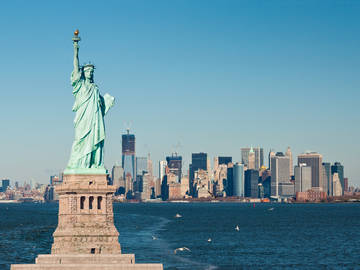What to Know'Liberal,' used in a general sense, can mean anything from "generous" to "loose" to "broad-minded." Used politically, it means "a person who believes that government should be active in supporting social and political change."
What does it mean to say that a person is a liberal, or to say that a thing may be described with this word? The answer, as is so often the case with the English language, is “it depends.”

Liberal can be traced back to the Latin word liber (meaning “free”), which is also the root of liberty ("the quality or state of being free") and libertine ("one leading a dissolute life"). However, we did not simply take the word liber and make it into liberal; our modern term for the inhabitants of the leftish side of the political spectrum comes more recently from the Latin liberalis, which means “of or constituting liberal arts, of freedom, of a freedman.”
We still see a strong connection between our use of the word liberal and liber in the origins of liberal arts. In Latin, liber functioned as an adjective, to describe a person who was “free, independent,” and contrasted with the word servus (“slavish, servile”). The Romans had artes liberales (“liberal arts”) and artes serviles (“servile arts”); the former were geared toward freemen (consisting of such subjects as grammar, logic, and rhetoric), while the latter were more concerned with occupational skills.
We borrowed liberal arts from French in the 14th century, and sometime after this liberal began to be used in conjunction with other words (such as education, profession, and pastime). When paired with these other words liberal was serving to indicate that the things described were fitting for a person of high social status. However, at the same time that the term liberal arts was beginning to make 14th century college-tuition-paying-parents a bit nervous about their children’s future job prospects, liberal was also being used as an adjective to indicate “generosity” and “bounteousness.” By the 15th century, people were using liberal to mean “bestowed in a generous and openhanded way,” as in “poured a liberal glass of wine.”
The word's meaning kept shifting. By the 18th century, people were using liberal to indicate that something was “not strict or rigorous.” The political antonyms of liberal and conservative began to take shape in the 19th century, as the British Whigs and Tories began to adopt these as titles for their respective parties.
Liberal is commonly used as a label for political parties in a number of other countries, although the positions these parties take do not always correspond to the sense of liberal that people in the United States commonly give it. In the US, the word has been associated with both the Republican and Democratic parties (now it is more commonly attached to the latter), although generally it has been in a descriptive, rather than a titular, sense.
The word has—for some people, at least—taken on some negative connotations when used in a political sense in the United States. It is still embraced with pride by others. We can see these associations with the word traced back to the early and mid-20th century in its combination with other words, such as pinko:
Thanks to The Dove, pinko-liberal journal of campus opinion at the University of Kansas, a small part of the world last week learned some inner workings of a Japanese college boy.
—Time: the Weekly Newsmagazine, 7 Jun., 1926"To the well-to-do," writes Editor Oswald Garrison Villard of the pinko-liberal Nation, "contented and privileged, Older is an anathema.
—Time: the Weekly Newsmagazine, 9 Sept., 1929Pinko liberals—the kind who have been so sympathetic with communistic ideals down through the years—will howl to high heaven.
—The Mason City Globe-Gazette (Mason City, IA), 12 Jun., 1940
The term limousine liberal, meaning "a wealthy political liberal," is older than many people realize; although the phrase was long believed to have originated in the 1960s, recent evidence shows that we have been sneering at “limousine liberals” almost as long as we have had limousines:
“Limousine liberals” is another phrase that has been attached to these comfortable nibblers at anarchy. But it seems to us too bourgeois. It may do as a subdivision of our higher priced Bolsheviki.
—New York Tribune, 5 May, 1919
Even with a highly polysemous word such as liberal we can usually figure out contextually which of its many possible senses is meant. However, when the word takes on multiple and closely-related meanings that are all related to politics, it can be rather difficult to tell one from another. These senses can be further muddied by the fact that we now have two distinct groups who each feel rather differently about some of the meanings of liberal.
One of these definitions we provide for liberal is “a person who believes that government should be active in supporting social and political change”; it is up to you to choose whether that is a good thing or a bad thing. In other words, “We define, you decide.”




